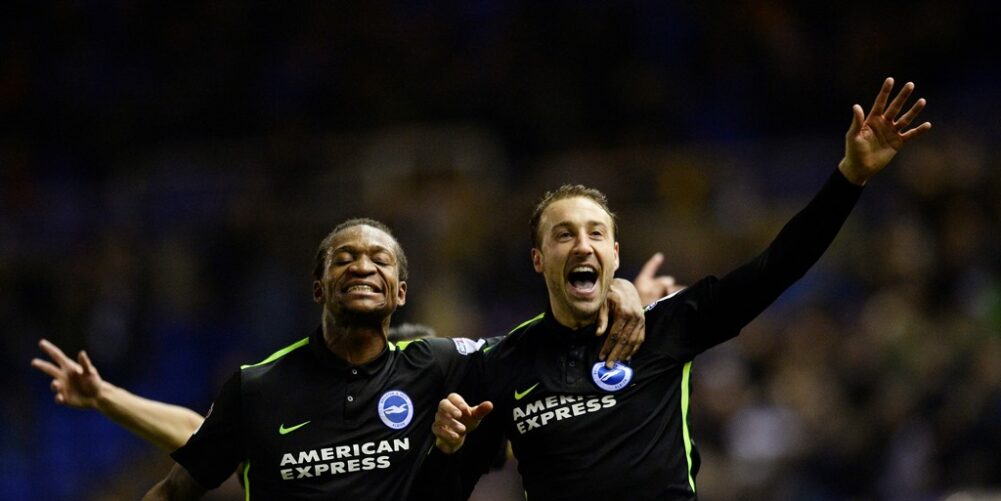(Photo: Action Images)
By Chris Dunlavy
AS the fragments of burst bubble drifted into the murk over St Andrews’ on Saturday evening, a small pocket of Brighton fans struck up a song.
One Glenn Murray. There’s only one Glenn Murray. Original? Hardly. But, in terms of power and sincerity, that simple paean was belted out with the intensity of Ace Of Spades.
This was supposed to be Franco Zola’s moment. The new Birmingham boss, appointed in a hailstorm of anger and controversy, was supposed to clinch his first three points, supposed to vindicate paymasters Trillion Trophy Asia, the Chinese fame-seekers whose decision to jettison Gary Rowett had as much to do with football as a tennis racket.
Then, Murray pounced, arching, heading, turning an 82nd-minute deficit into a 95th-minute lead, Blues players buckled to their knees, while Brighton’s coaching staff spilled on to the pitch.
Murray’s ecstatic 90-yard gallop, to celebrate with travelling fans, was one of the moments of the season, the joyful chant that followed significant in more ways than one.
It is five years since Murray, after three goal-laden seasons for the Seagulls, defected to bitter rivals Crystal Palace. Branded a mercenary and barracked mercilessly on his return, few imagined he would ever be welcomed back.
Was he offered more money at Selhurst Park? Yes. But this isn’t Wayne Rooney we’re talking about. Murray spent his formative years working odd jobs and playing for Barrow.
In his 20s, he earned a basic living in the lower leagues. Who wouldn’t grasp a chance to ensure financial security for their family?
Deep down, Brighton fans understood that. Deep down, Murray still cared for the club and the town where his kids went to school.
Earlier this year, I spoke to him about rejoining the Seagulls. Throughout the interview, he constantly broke off to ensure I wasn’t chasing a headline. “Just don’t make it sound like I had a tough time coming back or fell out with anyone,” he said. “It was never like that.”
Murray, a decent person who has always played down his ability, was genuinely concerned about his relationship with supporters.
That sprint and the serenade it produced felt like the last vestiges of mistrust slipping away, the bonds of a relationship fully renewed.
The Cumbrian has now scored 14 goals since his return. Asked about his impact, Brighton boss Chris Hughton was typically honest. “Last year we had Tomer Hemed, who scored goals,” he said. “Glenn… scores more goals.”
Which, after a season high on solidity but low on output was ended by Sheffield Wednesday in the play-offs, is exactly what Brighton needed.
Was Murray a popular signing? No – at 33, many fans felt his best years had gone.
Was he the kind of exotic overseas superstar who sells shirts and draws sponsors? No, he’s a craggy target man from Carlisle.
But, when it comes to holding up play, winning headers and putting the ball in the net, no striker in the division has such proven class.
If Birmingham’s owners were watching on Saturday, the message couldn’t have been starker if it was written in 20ft neon letters
We all know why TTA installed Zola. As the BBC’s Pat Murphy memorably put it, they’d rather have selfies with an Italian superstar than a homespun British defender. They want big names and big reputations, flashy baubles to garner envious glances back home.
They’d never want to sign a workaday player like Murray. They’ve probably never heard of Chris Hughton, a manager who makes Paul Scholes look ostentatious. Too drab. Too domestic.
Yet, as that soaring chant illustrated, there is a deepening trust and symbiosis between the fans in the stands, the player on the pitch and the man in the dugout. There is belief that this, after so many oh-so-nears, could be Brighton’s year.
Strategic thinking. A long-term plan. Proven, home-grown players of proven ability who care for their club and know what the Championship is about. A Murray-powered Brighton have the lot. Birmingham have only wealthy owners with pipe dreams.
















